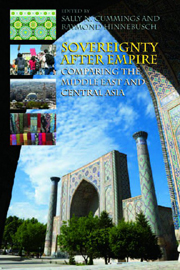Book contents
- Frontmatter
- Contents
- Acknowledgments
- Notes on the Contributors
- 1 Introduction
- SECTION I Histories of Empire and After
- 2 Russian Empires
- 3 The British and French Empires in the Arab World: Some Problems of Colonial State-formation and its Legacy
- 4 Ottoman Legacies and Economic Sovereignty in Post-imperial Anatolia, Syria and Iraq
- SECTION II Paths to Sovereignty: Views from the Core and Periphery
- SECTION III Empire and Domestic Sovereignty
- SECTION IV Empire and Popular Sovereignty
- SECTION V Empire and External Sovereignty
- Bibliography
- Index
3 - The British and French Empires in the Arab World: Some Problems of Colonial State-formation and its Legacy
from SECTION I - Histories of Empire and After
Published online by Cambridge University Press: 12 September 2012
- Frontmatter
- Contents
- Acknowledgments
- Notes on the Contributors
- 1 Introduction
- SECTION I Histories of Empire and After
- 2 Russian Empires
- 3 The British and French Empires in the Arab World: Some Problems of Colonial State-formation and its Legacy
- 4 Ottoman Legacies and Economic Sovereignty in Post-imperial Anatolia, Syria and Iraq
- SECTION II Paths to Sovereignty: Views from the Core and Periphery
- SECTION III Empire and Domestic Sovereignty
- SECTION IV Empire and Popular Sovereignty
- SECTION V Empire and External Sovereignty
- Bibliography
- Index
Summary
It has sometimes been suggested that the long-term significance of European imperialism in the Middle East and North Africa has been overrated. The imperial “moment” in the region, compared with the almost two centuries of British dominance in South Asia, the expansion of Russian power into Central Asia from the mid-sixteenth century to the 1860s, or the long life-spans of Dutch rule in Southeast Asia or of the Portuguese in southern Africa, was apparently brief, its ambitions restricted and its impact limited. Turkey and Iran escaped colonialism, experiencing only brief periods of foreign military occupation (which in the Turkish case was ended by nationalist military victory), and, with the notable exception of Algeria, actual European rule came relatively late to the Arab world and was of relatively brief duration. Syria and Lebanon were evacuated, however unwillingly, by the French in 1946 after twenty-six years' presence, at least the last five (and arguably the last ten) of which consisted in the drawn out crisis of the mandate regime. In Iraq, “formal” empire lasted just thirteen years (1919–32). After a vicious war of conquest, “settled” Italian rule in Libya lasted only twelve years (1931-43), and the entire period from the invasion of Tripolitania to effective independence – the first in Africa – spanned only forty years (1911–51). Egypt's formal independence, declared unilaterally by Britain in 1922, ended an un-“veiled” protectorate of only eight years' duration, and although British military occupation itself long preceded and outlasted formal rule, its duration, some seventy years, was “only” the length of a single lifetime.
- Type
- Chapter
- Information
- Sovereignty after EmpireComparing the Middle East and Central Asia, pp. 44 - 65Publisher: Edinburgh University PressPrint publication year: 2011

